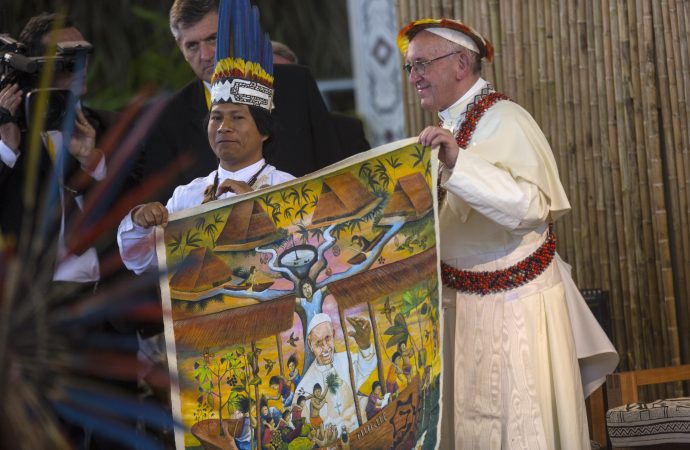With the Synod of Bishops on young people now in the rearview mirror, attention in Rome is being turned toward next year’s special synod on the Amazon, which one prelate says is a reflection of the pope’s deep commitment to developing an integral ecology.
In an interview with Crux, Bishop Vilson Basso of Imperatriz, located in an industrial region of northeastern Brazil, said he believes next year’s synod on the Amazon is “the dream of Pope Francis with Laudato Si, to put at the center of the Church’s concern, and that of the world, care of our common home.”
“We need the care of the whole world, that it be a place where everyone can live,” Basso said, adding that “this is integral ecology. The care of the earth and the care of the person, that they can have life, and an abundant life.”
Basso, who oversees the diocese of Imperatriz, Maranhão, Brazil, was one of some 300 participants in the Oct. 3-28 Synod of Bishops on young people, faith and vocational discernment, and he will also attend next year’s synod on the Amazon.
Titled “Amazonia: New Paths for the Church and for an Integral Ecology,” the gathering will take place in October 2019 on the Pan-Amazonian region of South America, which includes parts of Bolivia, Brazil, Colombia, Ecuador, French Guyana, Guyana, Peru, Venezuela and Suriname.
According to a preparatory document released in June, key themes for the meeting will be the role of women in the Church, the rights and traditions of indigenous people, and the exploration of new ways to provide greater access to the Eucharist in a region where numbers of clergy are slim.
To address the problem of the priest shortage in the area, some have floated the idea of ordination of viri probati - a term referring to mature, married men. Allowing such men to enter the priesthood has been pitched over the years as a possible solution to a shortage of priestly vocations in Brazil and across Latin America.
According to Basso, until now there has been no talk of the viri probati in his area, though he said the topic might come up later as preparations move forward.
In terms of access to the Eucharist, Basso said the biggest concern is “to create communities, so the people can gather around the Word of God,” and within that, access to the Eucharist will be a key theme.
“This is the path that the synod is going to punctuate,” he said, adding that from his view, the pope’s main reasons for calling the synod are not only the care of the Amazon, “which the pope has called the lung of the world,” but also to be attentive to the pastoral life of all those who live in the region.
With a shortage of clergy, Basso said one focus of his diocese is to work with lay missionaries, as priests often have to travel long distances between villages.
“If the Church does it with priests and sisters, also many lay people can work, who do missionary work in that whole area,” he said. “This is the concern of the pope, to bring the Word of God to everyone.”
Basso said the biggest issue for his diocese, which sits at the tip of the Amazon, will be how to work with some 7,100 indigenous people who live in the area.
“This is a challenge for us, to do a better work with them, to walk with them and to do pastoral and social work with them,” especially those who live near the Tocantins River, which runs through Brazil’s Maranhão state.
“The concern of the Church is for evangelization and the care of the common home. Care of the common home, care of the person, evangelization and care of that whole region,” he said, noting that his diocese has also been directly impacted by environmental changes over the past 50 years.
In the area, “there is not a lot of forest. It was there fifty years ago,” Basso said, and because of this, addressing environmental issues and engagement with local indigenous populations are the biggest challenges they want to bring to the table during the 2019 discussion.
Referring to Pope Francis’s 2015 environmental encyclical Laudato Si, Basso said he believes the heart of the document that will be conveyed during the 2019 discussion is “the monastic spirituality of living with little and being happy with the minimum necessary.”
“This is a very profound idea which goes against consumerism, it goes against the culture of waste, because we need the care of people and of the common home,” he said. “This is a path that we can all walk in this world, and there will be a home for everyone, food for everyone, and a good life for everyone in simplicity. This is a beautiful path. I think this is possible.”
In terms of preparation, Basso said they are at the beginning stages, with each of the Amazonian countries that will be involved in the synod currently focused on gathering answers to a questionnaire sent to dioceses in the region.
“All of the dioceses are in this first step, which is to listen to the different realities of the nine countries,” he said. The answers will then be sent to the Vatican, and based on these, “the Instrumentum Laboris document will be done,” he said, referring to the official working document of the synod.
Basso said there is continuity between the 2014-2015 Synods of Bishops on the family, this year’s synod on youth, and next year’s synod on the Amazon, because “young people have a great ecological sensitivity.”
The bishop said he is part of a WhatsApp group made up of young people from the Amazon who exchange ideas for what needs to be discussed during the October 2019 gathering, and he voiced hope that young people will also be present in the synod hall next year.

